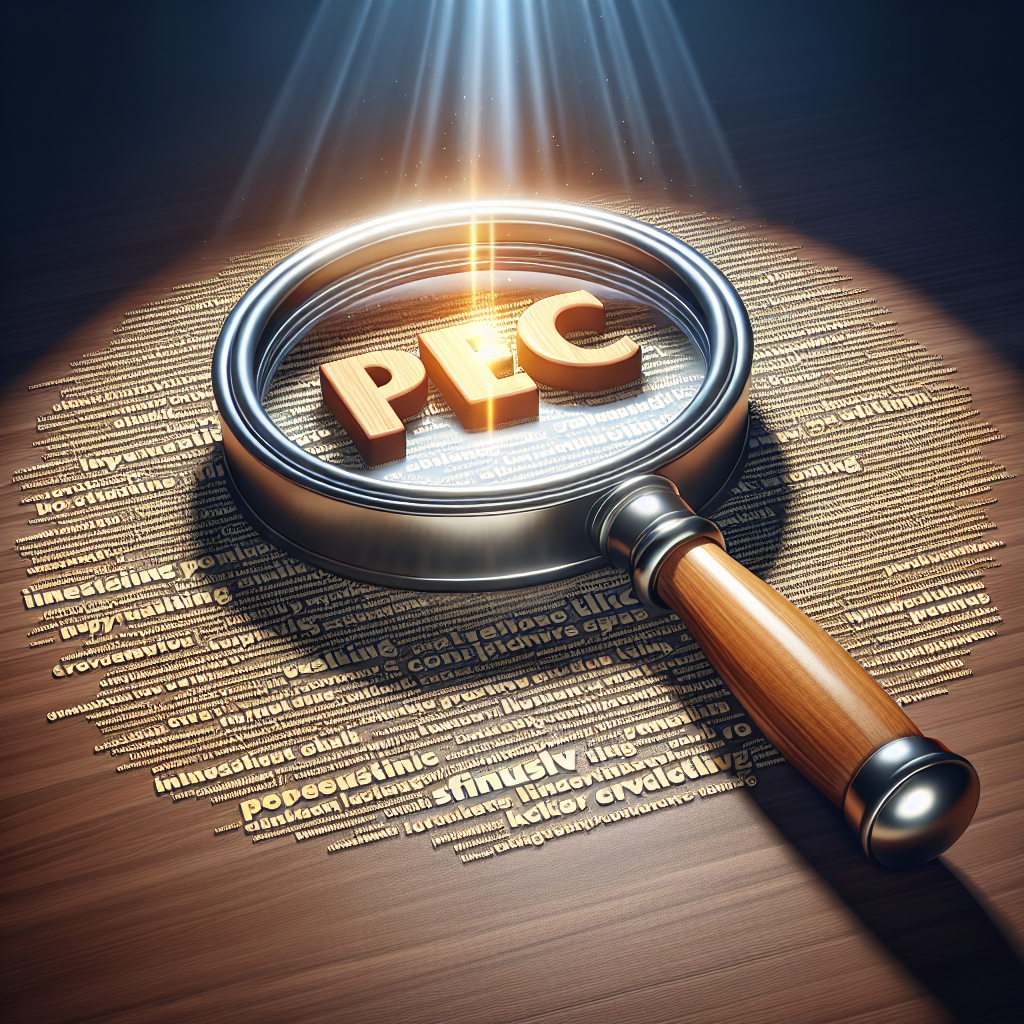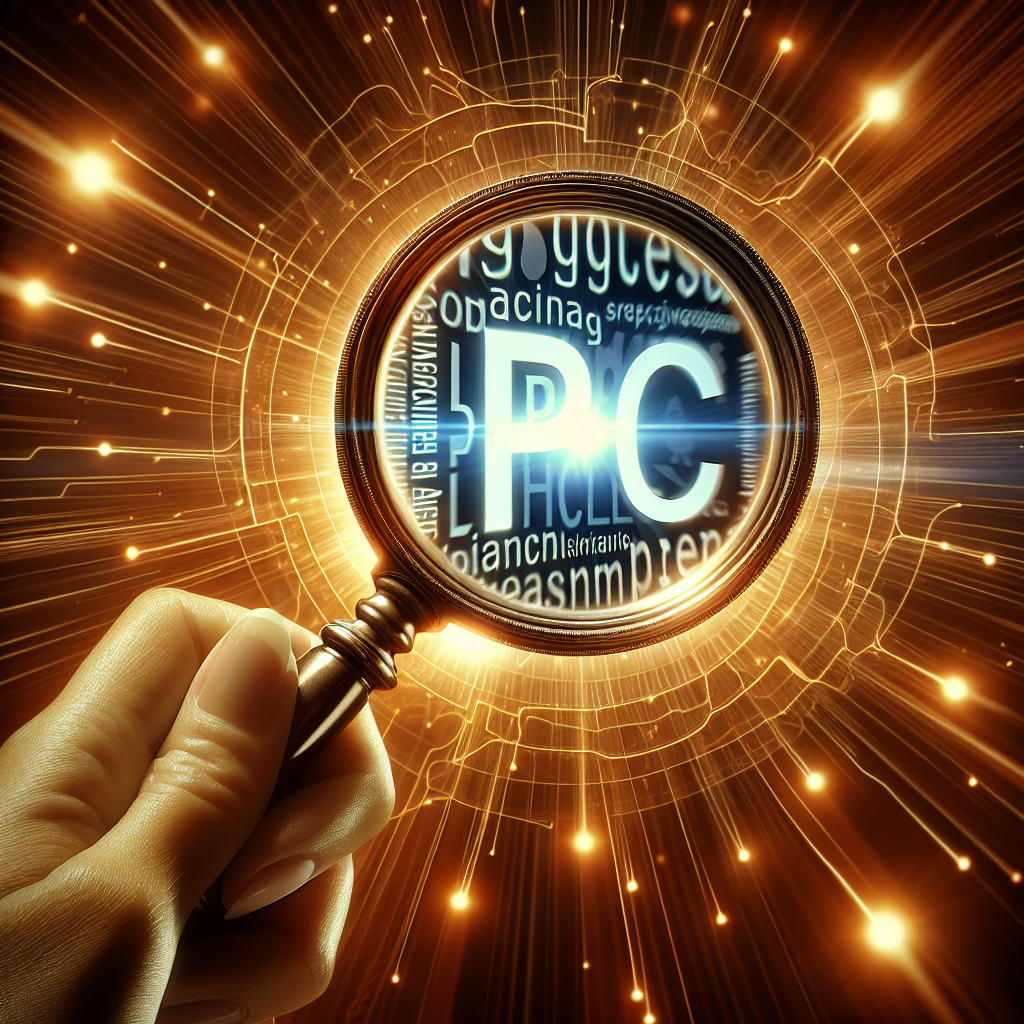In this article, you will discover valuable tips and strategies to optimize your PPC campaigns for high-converting keywords. If you are a business looking to improve the performance of your PPC campaigns, then this advanced guide is perfect for you. We will explore the benefits of working with High Priority Marketing and how their expertise can help you identify and optimize the keywords that will bring you the most conversions. Get ready to take your PPC campaigns to the next level and achieve the results you’ve been aiming for.
Understanding the Importance of High-Converting Keywords
In the world of PPC campaigns, choosing the right keywords is essential for driving conversions and maximizing campaign performance. High-converting keywords are those that have a higher likelihood of attracting potential customers and convincing them to take the desired action, whether it’s making a purchase, signing up for a newsletter, or filling out a form. Understanding the importance of high-converting keywords is key to creating successful PPC campaigns.
Why High-Converting Keywords Are Essential for PPC Campaigns
High-converting keywords play a crucial role in PPC campaigns because they directly influence the quality and relevance of the traffic you attract. By targeting keywords that are closely related to your product or service offering, you increase your chances of capturing the attention of potential customers who are actively searching for what you have to offer. This leads to higher conversion rates and a greater return on investment.
The Benefits of Targeting High-Converting Keywords in PPC Campaigns
Targeting high-converting keywords offers several benefits for PPC campaigns. Firstly, it helps to improve the efficiency of your ad spend by focusing on keywords that have a proven track record of generating conversions. Secondly, it allows you to create more relevant and compelling ad copy that resonates with your target audience, increasing the likelihood of them clicking on your ads. Lastly, targeting high-converting keywords enables you to optimize your campaign performance over time by analyzing which keywords are driving the most conversions and making data-driven decisions to refine your strategy. Overall, targeting high-converting keywords is a crucial component of any successful PPC campaign.
Conducting Keyword Research
Before you can target high-converting keywords in your PPC campaign, you need to conduct thorough keyword research. This involves identifying the keywords that are not only relevant to your business but also have a high likelihood of converting.
Using Keyword Research Tools
Keyword research tools are invaluable resources for identifying high-converting keywords. These tools provide insights into the search volume, competition level, and potential conversion rates for various keywords. By leveraging these tools, you can uncover hidden opportunities and identify keywords that are highly relevant to your target audience.
Analyzing Competitor Keywords
Analyzing competitor keywords is another effective way to uncover high-converting keywords. By studying the keywords your competitors are targeting, you can gain valuable insights into what is already working in your industry. This can help you identify gaps in the market and find unique keyword opportunities that your competitors may have overlooked.
Identifying Long-Tail Keywords for High Conversions
Long-tail keywords are specific and highly targeted search phrases that tend to have lower search volumes but higher conversion rates. These keywords are often less competitive, making them an attractive option for businesses looking to target niche markets. By identifying long-tail keywords relevant to your industry, you can increase the chances of attracting highly qualified leads and driving conversions.


Organizing and Categorizing Keywords
Once you have gathered a list of high-converting keywords, it’s important to organize and categorize them effectively to optimize your PPC campaign’s performance.
Creating Relevant Ad Groups
Organizing your keywords into relevant ad groups allows you to create more targeted and customized ad copy. By grouping keywords that have similar themes or intents, you can tailor your ads to specific audience segments, increasing their relevance and effectiveness. Organizing your keywords into ad groups also makes it easier to track and measure the performance of each group, allowing you to make data-driven optimizations.
Using Keyword Match Types
Keyword match types are parameters that dictate how closely a user’s search query must match your targeted keywords for your ads to be shown. By using different match types, such as broad match, phrase match, and exact match, you can control the reach and relevance of your ads. This helps you target the right audience with precision and ensure that your ads are shown to users who are actively searching for what you offer.
Leveraging Negative Keywords to Improve Conversion Rate
Negative keywords are keywords that you specify to prevent your ads from being triggered by certain search queries. By identifying and leveraging negative keywords, you can refine your targeting and improve your conversion rate. For example, if you sell luxury watches and don’t want to attract users looking for “cheap watches,” you can add “cheap” as a negative keyword. This ensures that your ads are shown to users who are more likely to convert.
Designing Effective Ad Copy
Once you have organized your keywords and ad groups, the next step is to design compelling ad copy that aligns with your targeted keywords and resonates with your audience.
Aligning Ad Copy with Keywords
Creating ad copy that aligns with your targeted keywords is crucial for maximizing the performance of your PPC campaigns. By including the targeted keywords in your ad headlines and ad body text, you increase the relevance and visibility of your ads. This not only improves your click-through rate but also helps to attract qualified leads who are more likely to convert.
Crafting Compelling Calls-to-Action
A strong and compelling call-to-action (CTA) is essential for driving conversions. Your CTA should clearly communicate the desired action you want users to take, whether it’s “Buy Now,” “Sign Up Today,” or “Learn More.” By designing compelling CTAs that create a sense of urgency or offer a clear benefit, you can encourage users to click on your ads and take the desired action.
Utilizing Ad Extensions for Enhanced Performance
Ad extensions are additional pieces of information or functionalities that can be added to your ads to provide more context and encourage user engagement. Examples of ad extensions include sitelink extensions, call extensions, and review extensions. By leveraging ad extensions strategically, you can enhance the visibility and performance of your ads, increasing the likelihood of conversions.


Landing Page Optimization
While driving traffic to your website through PPC campaigns is important, it’s equally crucial to ensure that your landing pages are optimized for conversions.
Ensuring Landing Page Relevance to Keywords
Your landing pages should be highly relevant to the keywords you are targeting in your PPC campaigns. When users click on your ads, they should be taken to a landing page that aligns with their search intent and provides them with the information or offer they were expecting. By ensuring landing page relevance to keywords, you can improve the overall user experience and increase the likelihood of conversions.
Streamlining Landing Page Design and Navigation
The design and navigation of your landing pages play a significant role in the user experience and conversion rate. A clean, visually appealing design that focuses on the key message or offer will help to engage users and keep them on your landing page. Additionally, a clear and intuitive navigation structure will make it easier for users to find the information they are looking for and take the desired action.
Implementing Clear and Concise CTAs
Just as you craft compelling CTAs for your ads, it’s important to have clear and concise CTAs on your landing pages. Your CTA should be prominently displayed and communicate the desired action you want users to take. By making it easy for users to understand what they need to do next, you can reduce friction, improve the user experience, and increase the conversion rate.
Monitoring and Analyzing Campaign Performance
To optimize your PPC campaigns for high-converting keywords, it’s crucial to continually monitor and analyze their performance. This allows you to identify areas for improvement and make data-driven decisions to refine your strategy.
Tracking and Measuring Key Metrics
Tracking and measuring key metrics, such as click-through rate, conversion rate, and cost per conversion, provides valuable insights into the performance of your PPC campaigns. By regularly monitoring these metrics, you can identify trends, spot areas of underperformance, and make necessary adjustments to improve your campaign’s effectiveness.
Identifying Low-Performing Keywords
Analyzing the performance of your keywords is essential for optimizing your PPC campaigns. By identifying low-performing keywords that are not driving conversions, you can reallocate your budget towards high-converting keywords or experiment with different keyword variations. This helps to improve the efficiency of your ad spend and maximize your return on investment.
Implementing A/B Testing for Improvement
A/B testing involves creating multiple variations of your ads, landing pages, or CTAs and testing them against each other to determine the most effective option. By implementing A/B testing, you can make incremental improvements to your PPC campaigns and optimize for high-converting keywords. Whether it’s testing different ad headlines, landing page layouts, or CTAs, A/B testing allows you to continually iterate and improve your campaign’s performance.


Refining and Tweaking Keywords
Optimizing your PPC campaigns for high-converting keywords is an ongoing process that requires constant refinement and tweaking.
Making Keyword Bids Adjustments
Keyword bid adjustments allow you to increase or decrease your bids for specific keywords based on their performance. By analyzing the data and adjusting your keyword bids accordingly, you can prioritize high-converting keywords and maximize your ad visibility to the most valuable audience.
Adding New High-Converting Keywords
As you monitor and analyze the performance of your PPC campaigns, you may uncover new high-converting keywords that were not initially part of your keyword research. By regularly adding new high-converting keywords to your campaigns, you can expand your reach and capture additional qualified leads.
Removing Underperforming Keywords
On the flip side, it’s important to remove underperforming keywords from your PPC campaigns to optimize your budget and improve your campaign’s performance. By regularly reviewing the performance of your keywords and removing those that are not driving conversions, you can focus your resources on the keywords that generate the highest return on investment.
Utilizing Remarketing Strategies
Remarketing allows you to target users who have previously visited your website or interacted with your ads. By tailoring your ads specifically for these audiences, you can increase your chances of re-engaging them and driving conversions.
Targeting Previous Website Visitors
By targeting previous website visitors, you can remind them of your brand and encourage them to return and take the desired action. Remarketing allows you to present relevant offers or incentives to users who have shown interest in your products or services, increasing the likelihood of them converting.
Tailoring Ad Copy for Remarketing
Remarketing ads should be tailored specifically for users who have already interacted with your brand. By addressing their previous interactions or highlighting personalized offers, you can create a sense of familiarity and increase the chances of conversion. Tailoring your ad copy for remarketing helps to create a more personalized and relevant user experience.
Experimenting with Custom Audiences
Custom audiences allow you to create highly targeted lists of users based on specific criteria, such as demographics, interests, or past behaviors. By experimenting with custom audiences, you can reach highly relevant and engaged audiences, increasing the effectiveness of your remarketing campaigns. Whether it’s targeting users who have abandoned their shopping carts or users who have spent a certain amount of time on your website, custom audiences offer endless possibilities for optimizing your PPC campaigns.


Leveraging PPC Campaigns with SEO
PPC and SEO are two powerful digital marketing strategies that can complement each other when used strategically.
Aligning PPC and SEO Strategies
Aligning your PPC and SEO strategies allows you to create a holistic approach to digital marketing. By targeting high-converting keywords in both your PPC campaigns and SEO efforts, you can increase your visibility in search engine results and capture more qualified leads. Additionally, insights gained from your PPC campaigns, such as the performance of certain keywords, can inform your SEO strategy and vice versa.
Identifying High-Converting Organic Keywords
Analyzing the organic keywords that are driving conversions on your website can provide valuable insights for your PPC campaigns. By identifying high-converting organic keywords, you can target them more aggressively in your PPC campaigns, increasing your chances of attracting qualified leads and driving conversions. Understanding the overlap between high-converting organic keywords and PPC keywords helps you optimize both strategies for maximum impact.
Optimizing PPC Campaigns based on SEO Insights
Insights gained from your SEO efforts, such as the performance of certain landing pages or the effectiveness of certain meta tags, can be used to optimize your PPC campaigns. By applying SEO insights to your PPC strategy, you can ensure that your landing pages are optimized for conversions and that your ad copy aligns with the messaging on your website. This consistency and alignment improve the user experience and increase the likelihood of conversions.
Working with High Priority Marketing
Partnering with High Priority Marketing offers several benefits for businesses looking to optimize their PPC campaigns for high-converting keywords.
Benefits of Partnering with High Priority Marketing
High Priority Marketing is a leading digital marketing agency that specializes in PPC campaign optimization. By working with High Priority Marketing, you gain access to a team of experienced professionals who have a deep understanding of the PPC landscape. They can help you identify high-converting keywords, design effective ad copy, and optimize your landing pages for maximum conversions. Partnering with High Priority Marketing allows you to leverage their expertise and industry knowledge to achieve better results from your PPC campaigns.
Advanced Strategies for Optimizing PPC Campaigns
High Priority Marketing employs advanced strategies and techniques to optimize your PPC campaigns for high-converting keywords. By staying up-to-date with the latest trends and best practices in PPC advertising, they can help you stay ahead of the competition and drive maximum results. From A/B testing and remarketing to keyword bid adjustments and landing page optimization, High Priority Marketing offers a comprehensive range of strategies to elevate your PPC campaigns.
Case Studies and Success Stories
High Priority Marketing has a proven track record of success in optimizing PPC campaigns for high-converting keywords. Their portfolio of case studies and success stories showcases the results they have achieved for their clients, including increased conversion rates, improved ROI, and enhanced campaign performance. By partnering with High Priority Marketing, you can benefit from their expertise and tap into their wealth of knowledge to drive success for your own PPC campaigns.
In conclusion, optimizing your PPC campaigns for high-converting keywords is crucial for driving conversions and maximizing campaign performance. By conducting thorough keyword research, organizing and categorizing your keywords effectively, designing compelling ad copy, optimizing your landing pages, monitoring and analyzing campaign performance, refining and tweaking your keywords, utilizing remarketing strategies, leveraging PPC campaigns with SEO, and partnering with High Priority Marketing, you can create successful PPC campaigns that drive tangible results for your business.


